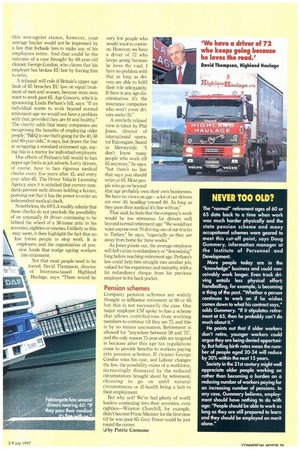NEVER TOO OLD?
Page 41

If you've noticed an error in this article please click here to report it so we can fix it.
The "normal" retirement ages of 60 or 65 date back to a time when work was much harder physically and the state pension scheme and many occupational schemes were geared to meet this cut-off point, says Doug Gummery, information manager at the Institute of Personnel and Development.
More people today are in the "knowledge" business and could conceivably work longer. Even truck driving entails less physical effort; handballing, for example, is becoming a thing of the past. "Whether a person continues to work on if he wishes comes down to what his contract says," adds Gumrnery. "If it stipulates retirement at 65, then he probably can't do much about it."
He paints out that if older workers don't retire, younger workers could argue they are being denied opportunity. But falling birth rates mean the number of people aged 20-34 will reduce by 20% within the next 15 years.
Society in the 21st century might well appreciate older people working on rather than becoming a burden on a reducing number of workers paying for an increasing number of pensions. In any case, Gummery believes, employment should have nothing to do with age: "People should be able to work as long as they are still prepared to learn and they should be employed on merit alone."








































































































